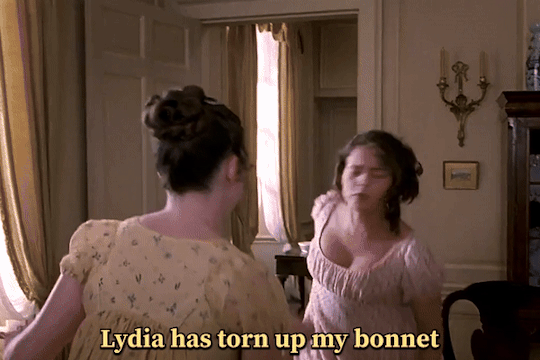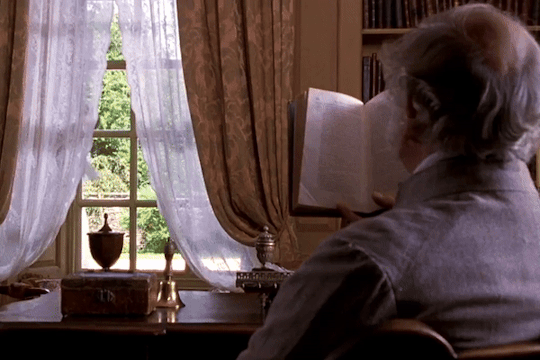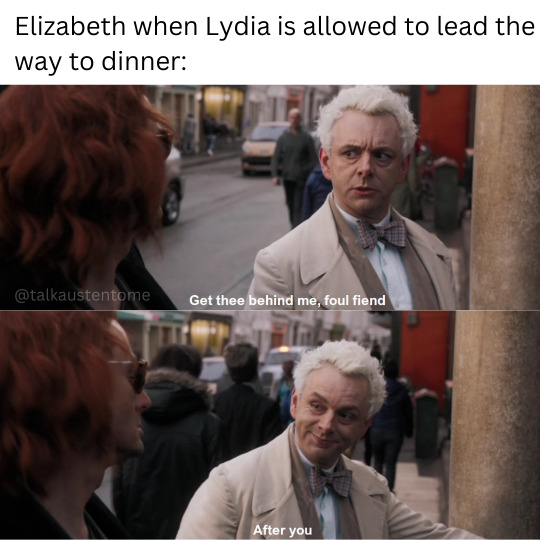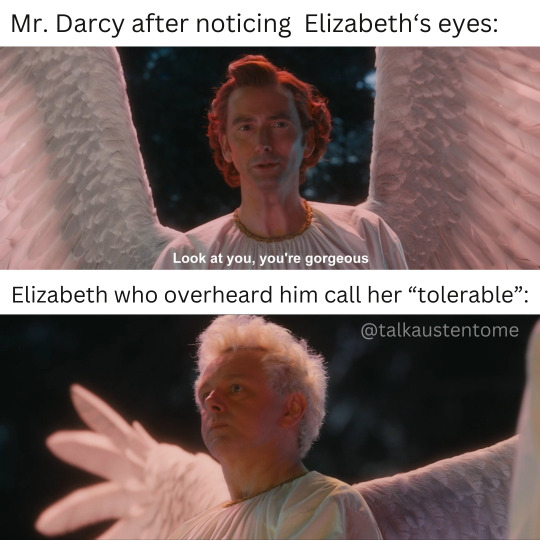#mr. bennet
Explore tagged Tumblr posts
Text
For the past several years (and perhaps longer) in the P&P fandom I've seen a lot of people who want to rehabilitate Mrs. Bennet: like, sure, she's uncouth and seems greedy, but it's because she cares so much about her daughters' futures; her situation is actually really stressful and uncertain and she's powerless to change it and her husband makes fun of her, and so it's natural that it would cause her to be anxious all the time; maybe she doesn't have the intelligence or social awareness to understand that her behaviour is actually harming her daughters' prospects, but at least her heart is in the right place.
I'm usually not the type of person who argues that fandom is actually being too nice to a female character, but in this case I don't buy the counter-narrative (which I think is popular enough at this point to be fanon / a narrative in itself) about Mrs. Bennet.
For one thing, she was never really powerless in this situation. These people are rich even for gentry. Mr. Bennet's income was always good, at 2,000 pounds per annum (even though I can't believe he isn't neglecting some practices that could raise it higher). Mrs. Bennet had 4,000 pounds from her parents and a further 1,000 from Mr. Bennet. Invested in the 4 per cents (for example), this is 200 pounds per year in pin money that Mrs. Bennet could spend without touching the principle of her dowry, and without affecting Mr. Bennet's income. This is more than some people's entire yearly incomes.
The picture of Mr. and Mrs. Bennet that we get in P&P is not of people who are helpless against their circumstances, but of people who are extraordinarily neglectful. We're told that:
Mr. Bennet had very often wished, before this period of his life, that, instead of spending his whole income, he had laid by an annual sum, for the better provision of his children, and of his wife, if she survived him. [...] When first Mr. Bennet had married, economy was held to be perfectly useless; for, of course, they were to have a son. This son was to join in cutting off the entail, as soon as he should be of age, and the widow and younger children would by that means be provided for. Five daughters successively entered the world, but yet the son was to come; and Mrs. Bennet, for many years after Lydia’s birth, had been certain that he would. This event had at last been despaired of, but it was then too late to be saving. Mrs. Bennet had no turn for economy; and her husband’s love of independence had alone prevented their exceeding their income.
We also know that the "continual presents in money which passed to [Lydia] through her mother’s hands," plus her allowance and food, amount to about 90 pounds per year. Rather than saving up from the beginning in case the entail is not broken, rather than beginning to save once it's clear a son will not arrive, rather than making Jane's dowry the full 5,000 from her mother (which would be something) and saving up for the younger girls' dowries thereafter—which is what would be typical, and that's why Lady Catherine was so shocked that all the girls were out at once—Mrs. Bennet's housekeeping, dress, the girls' allowance, presents of money over and above their allowance, plus whatever Mr. Bennet is spending money on (and other expenses relating to servants, carriages, maintenance &c. which are unavoidable), add up to their entire income. The only reason why Mrs. Bennet doesn't overspend even that is that that's where Mr. Bennet puts his foot down.
Mrs. Bennet is actively harming her daughters' prospects, not even of marriage, but of living respectably if they don't marry, because she doesn't have the temperance not to spend all of the income that is allotted to her. It is the role of the woman in a marriage to take charge of the housekeeping, servants, cooking, furniture, and all expenses relating thereto (plus certain attentions to her tenants and any living in genteel poverty in the area, though presumably this will depend on her income and whether there's a parish church with a parson's wife who's doing some of these things). She's an adult who should be competent to manage these things in a reasoned way without needing to be dictated to.
It is supposed to be the role of the woman in a marriage to take charge of her daughters' education—and yet Mrs. Bennet did not hire a governess, and Elizabeth says that she didn't spend much time teaching her daughters anything (it's not clear to what degree she's educated herself). Granted, the girls did have masters—but, from the sounds of things, that was only if they requested them. No one was required to learn much of anything, which will probably further harm the marriage prospects of the girls who "chose to be idle."
I think the "point" of Mrs. Bennet is that she is one half of one type of bad marriage which the novel illustrates, in contrast with the Gardiners' marriage. These marriages are two possible models for the Bennet daughters to look to. At one point, Elizabeth's prospective marriage is explicitly compared to her parents', with her in the role of her father: Mr. Bennet says "My child, let me not have the grief of seeing you unable to respect your partner in life" (emphasis original).
We might wonder whether Elizabeth saw herself potentially in the role of her father, in a marriage that was very intellectually unequal, when she rejected Mr. Collins; or whether she also saw herself in the role of her mother, married to a man who insults and doesn't respect her, when she rejected Mr. Darcy. Ultimately, she accepts Mr. Darcy after she realises that he is nothing like her father; that he is diligent in attending to his responsibilities, and that he does evidently respect her mind.
This isn't me defending Mr. Bennet, who is also a bad parent and a bad spouse. I do, however, find it a little disturbing when people suggest that Mr. Bennet is at fault for not controlling or curtailing his wife. His wife is a grown woman. Surely we don't actually believe that a situation where a man is legally in complete control over his wife, merely because he is a man and she is a woman, is in any way natural, moral, or just? (This also goes for people who suggest that Mr. Bingley needs to get his sister 'in line' 😬😬😬.)
Mrs. Bennet should be competent to manage her household and her daughters. Given that she's not, yes, Mr. Bennet, according to Georgian and Victorian ideas of the role of a man in a marriage, "should" have stepped in and started dictating to her. But I don't really think that's what Austen is suggesting went wrong here. The models of good marriages we have—the Gardiners, the Bingleys and Darcys after their weddings—are all ones in which the women were basically sensible people to begin with. In the latter two cases, we are told of particular ways in which the men stand to benefit from some mental quality of their future spouse (Elizabeth's good humour and ease in company; Jane's steadiness and determination).
The ideal which some Georgians had of a husband's role being to shape his wife's intellect doesn't seem to be what's being advocated here. If Mr. Bennet made a mistake, it was in marrying a silly, selfish, ill-tempered woman to begin with, not in failing to browbeat her into submission once he found out that she was silly, selfish, and ill-tempered. The idea is that you should choose your spouse carefully. But that message doesn't work if Mrs. Bennet is just a woman in a difficult situation who has her heart in the right place.
3K notes
·
View notes
Text










Pride and Prejudice 2005 ☼ dir. Joe Wright
#pride and prejudice#papedit#elizabeth bennet#donald sutherland#mr. bennet#filmedit#2000s#creations#kardelen
4K notes
·
View notes
Text
On Mr. Bennet
I actually think that Mr. Bennet was probably the most similar to Lydia for all that as his favourite daughter Lizzy shared his penchant for books and witticisms about other people.
The thing about Mr. Bennet is he's chiefly concerned with his own amusement, his own interests, while Mrs. Bennet panics over the entailment and what they'll do when he's dead he brushes it off and takes no action, if pushed on it he gets passive-aggressive. He's not interested in thinking about a world where he's dead or preparing for it, and while that's obviously irresponsible it's also not like that mindset's uncommon even today. Mr. Bennet doesn't save money, Mr. Bennet reads and jokes around, taking nothing seriously. Mr. Bennet is prepared to make fun of his young daughters "They are all silly and ignorant like other girls but Lizzy has something more of quickness than her sisters" and tease his wife "You mistake me dear I have a high respect for your nerves, they are my old friends." and everyone else that he comes into contact with "For what do we live, but to make sport for our neighbours, and laugh at them in our turn?" "Mr. Bennet’s expectations were fully answered. His cousin was as absurd as he had hoped; and he listened to him with the keenest enjoyment, . . . and, except in an occasional glance at Elizabeth, requiring no partner in his pleasure." He amuses himself with their antics without stepping in to teach the daughters he's responsible for better 'more respectable' ways to behave especially in regards to the scenes they make in public. That's far less entertaining after all. And would require him to actually put work in rather than look down on them as an observer.
Lizzy mirrors his behaviour a lot at the start of the book in regards to making character judgements about the people around her, but her care in trying to make sure her younger sister doesn't drink too much at the ball for example is something he never would've bothered with and she learns over the course of the book to be less prideful about her 'discernment' and less liable to allow herself to be prejudiced against the people she meets based on hearsay or first impressions.
Lydia meanwhile is similarly entertaining as a member of the family early in the book and later on is revealed to be similarly selfish in what her indifference to the consequences of her choices will mean for the rest of the family, in the note explaining that she has run off with Wickham, Lydia writes “What a good joke it will be!”
While her sense of humour is less cynical and sarcastic than her father's the fact she places priority on what's fun rather than the right thing to do makes her a very interesting parallel. Of course this is also an indicator of her immaturity and her parents' failures to educate her properly but Lydia ends up being a foil for both her parents', the result of their enabling and neglectful parenting styles and a merging of their worst qualities/personality traits. In fact her marriage echoes their own "My child, let me not have the grief of seeing you unable to respect your partner in life." in how she marries thoughtlessly, for attraction rather than love. As ridiculous and inconsiderate as her mother; as passive, selfish and careless in regards to 'duty to the family' as her father and as conceited as both of them.
In the end, he jokes about how quickly his guilt for the situation will pass and he decides not to pay an allowance for her clothes or allow her to visit “I will not encourage the impudence of either, by receiving them at Longbourn.” but this is of course in line with his behaviour all throughout the book. If it's not interesting to him he either makes fun of it or avoids it. Having Lydia at Longbourne would mean facing his mistakes with her or even the similarities her marital situation shares with his own and that would be uncomfortable. Unlike Lizzy and Darcy he doesn't change himself at all despite the pressures of the situations he encounters over the course of the book, and sadly neither did Lydia. They didn't want to you see. So they didn't bother and thanks to the efforts of other people, it mostly all worked out for them. At least on the surface.
302 notes
·
View notes
Text







I love him
Keira Knightley as Elizabeth Bennet and Donald Sutherland as Mr. Bennet in Pride & Prejudice (2005) dir. Joe Wright
#pride and prejudice#perioddramaedit#filmedit#filmgifs#weloveperioddrama#onlyperioddramas#perioddramasonly#perioddramasource#perioddramacentral#papedit#austenedit#elizabeth bennet#mr. bennet#keira knightley#donald sutherland#joe wright#jane austen#ppgifs#mine
205 notes
·
View notes
Text

68 notes
·
View notes
Text

Fandom: Pride and Prejudice - Jane Austen
Sample Size: 3,122 stories
Source: AO3
#elizabeth bennet#fitzwilliam darcy#jane bennet#charles bingley#lydia bennet#george wickham#william collins#charlotte lucas#mary bennet#mr. bennet#mrs. bennet#george knightley#emma woodhouse#anne elliot#frederick wentworth#colonel fitzwilliam#pride and prejudice#fanfiction#ao3#statistics#phantom statistician#elizabethdarcy#dizzie
121 notes
·
View notes
Text
Mr. Knightley 🤝 Mr. Bennet
"What a woman really needs and/or wants is to be jilted."
Mr. Knightley: "It would not be a bad thing for her to be very much in love with a proper object. I should like to see Emma in love, and in some doubt of a return; it would do her good."
Mr. Bennet: “So, Lizzy,” said he one day, “your sister is crossed in love, I find. I congratulate her. Next to being married, a girl likes to be crossed a little in love now and then. It is something to think of, and it gives her a sort of distinction among her companions. When is your turn to come? You will hardly bear to be long outdone by Jane. Now is your time. Here are officers enough in Meryton to disappoint all the young ladies in the country. Let Wickham be your man. He is a pleasant fellow, and would jilt you creditably.”
Since when is being jilted or doubtful in love healthy or beneficial? We need to send these guys pamphlets about the Troubling Case of Marianne Dashwood!
111 notes
·
View notes
Text

#nymphpens#dark academia#poets on tumblr#dead poets society#relatable#tumblr text post#classic literature#jane austen#pride and prejudice#classic literature memes#arrested development#arrested development memes#arrested development x pride and prejudice#pride and prejudice memes#elizabeth bennet#mary bennet#mr. bennet#mrs. bennet#arrested development x classic literature#literature memes#literary memes
228 notes
·
View notes
Text
Anybody else wondering if the quarrel Mr Bennet had with Mr Collins' father was because Mr Bennet wanted to break the entail so his daughters could inherit but the senior Mr Collins refused?
#pride and prejudice#pride & prejudice#jane austen#mr bennet#mr. bennet#mr collins#mr. collins#mr collins' father#mr. collins' father#william collins#mr collins sr
16 notes
·
View notes
Text

12 notes
·
View notes
Text





Pride & Prejudice (1995) Episode 01
#Pride & Prejudice (1995)#Episode 01#Elizabeth Bennet#Lydia Bennet#Catherine Bennet#Mr. Bennet#Jennifer Ehle#Julia Sawalha#Polly Maberly#Benjamin Whitrow
29 notes
·
View notes
Text

Today at Pemberley, The 27th of January:
Mr. Darcy was attempting to please Mr. Bennet with stories of Lady Anne Darcy’s late uncle, who in addition to a prolific scholar had been something of a pirate and a scallawag. Mr. Bennet expressed many regrets not to have been able to know such an infamous character and offered a witticism on the unjust nature of fortune.
However, Mr. Darcy’s attention had wandered from his goal of impressing his father-in-law to a rather odd sight. Mrs. Darcy and Miss Mary Bennet stood close together at the front door, smiling and nodding in easy accord.
“Do you have any notion what has caused such harmony among your daughters?”
Mr. Bennet followed Mr. Darcy’s line of vision. “I make it my life’s business not to know such things. You will find out once you and Lizzie have children of your own, the more ignorant you are then the more successful a father you’ll be.”
Previous days at Pemberley here
#today at pemberley#pride and prejudice#regency#jane austen#mr. darcy#darcy#mr. bennet#the Bennett#in-lawing#pemberley#fiction#writing#creative writing#daily writing#microfiction#atpem
19 notes
·
View notes
Text

20 June 2024







Donald McNichol Sutherland, CC
17 July 1935 – 20 June 2024
30 notes
·
View notes
Text
Don’t mind me, just out here creating Jane Austen memes out of Good Omens stills while processing season 2 (Go watch it!). I’m sure Aziraphale would approve.
Pride and Prejudice x Good Omens

Just like Crowley, Elizabeth knows what’s coming, and she wishes she didn’t have to be there.

I wonder what Wickham’s punishment in the Good Omens hell would have looked like.

“Ah! Jane, I take your place now, and you must go lower, because I am a married woman.” I kinda love how obnoxious married Lydia is.

Truly one of my favourite moments in Austen’s novels, and any love story ever, is Mr. Darcy declaring Elizabeth “tolerable” and looking at her again to confirm his original verdict, only to go: “Daaamn. I was wrong.” (Also, the things I’d do to get a version of Darcy that does the Good Omens apology dance for Elizabeth.)

Thankfully, 10k a year helped Mrs. Bennet to change her mind about Darcy again very quickly.

The biggest change I’ve gone through since first getting into Austen was definitely going from loving Mr. Bennet because of his sarcasm to thinking he’s actually kind of awful.

Caroline Bingley, the original pick-me girl?
#There’s more coming (about other Austen novels) but I’ll leave it at that for now#Jane Austen x Good Omens#Jane Austen#Jane Austen meme#jane austen memes#Pride and Prejudice x Good Omens#Pride and Prejudice#Pride and Prejudice Memes#Pride and Prejudice meme#Elizabeth Bennet#Mary Bennet#Mrs Bennet#mrs. bennet#Mr Bennet#Mr. Bennet#Mr. Darcy#Mr Darcy#Caroline Bingley#Lydia Bennet#memes#Good Omens Season 2 Spoilers#Good Omens 2 Spoilers
100 notes
·
View notes
Text

22 notes
·
View notes
Text
My latest post on Always Austen:
73 notes
·
View notes